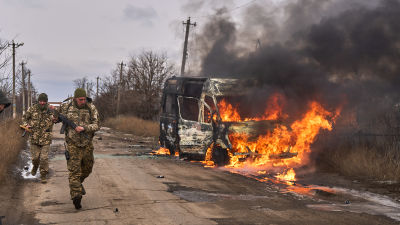War in Ukraine: Latest developments and public support for Putin and Zelenskyy explained

By James Gray, Multimedia Producer
Russia's invasion of Ukraine is approaching its two-year anniversary and, as is the nature with war, the story is one that constantly evolves.
To date, fighting in Ukraine is estimated to have killed hundreds of thousands of people and forced millions from their homes.
But the emergence of new global developments, such as the war between Israel and Hamas, has shifted attention away from eastern Europe, with a former Nato secretary-general warning the world's attention must "stay on Ukraine".
Here, ITV News assesses the current state of play in the war between Russia and Ukraine, and explores what the level of public backing is for Vladimir Putin and Volodymyr Zelenskyy.
Where are we at now?
Fighting between both sides remains concentrated in eastern Ukraine, particularly the city of Avdiivka, in the country's eastern Donetsk region.
Russian forces have made the city a key target since the start of the war in February 2022, and are pushing to complete a full encirclement of it.
Avdiivka is currently a Ukrainian stronghold south of Bakhmut - scene of some of the fiercest fighting in the war - and is viewed as a gateway to parts of the Donetsk region under Kyiv's control.
Dr Huseyn Aliyev, a lecturer in Central & East European Studies at the University of Glasgow, told ITV News that Avdiivka was "probably the most critical situation" for Ukraine.
"There's been very intense fighting in Avdiivka, which, unfortunately, has not been very favourable for the Ukrainian side.
"They've lost a number of positions. They are still holding on, but Russia is using massive military pressure on Avdiivka currently."
Elsewhere, Russian forces have launched renewed attempts to reclaim parts of the city of Bakhmut, which Ukraine captured in the wake of its summer counteroffensive.
Launched earlier this year, the assault has yielded only incremental gains, leading the commander in-chief of Ukraine's armed forces to admit "there will most likely be no deep and beautiful breakthrough".
General Valery Zaluzhnyi conceded to The Economist that a significant technological leap is needed to break the deadlock on the battlefield.
The UK Defence Ministry warned in November that there were "few immediate prospects of major changes in the front line".
Ukraine's military has claimed that some of the gains made in the past month have emerged on the Russian-held eastern bank of the Dnieper River - which divides the partially occupied Kherson region.
Multiple footholds have been established by Ukrainian forces, the military said, leading to Russia launching a number of unsuccessful attempts to retake lost territory.
'There will be lots of snow, lots of mud'
As we approach the start of winter, Dr Aliyev said the weather would present a "major challenge" to both sides of the war.
He said: "Much of the frontlines in Donbass [region], in particular, but also to a certain extent in the south of Ukraine will be very difficult for any sort of offensive operations because of the terrain.
"There will be lots of snow, lots of mud, especially in the south where there's not so much snow as there is actually muddy conditions, which prevent the movement of armoured vehicles, artillery and so on."
Consequently, he said that ground offensives for either Russia or Ukraine will be "relatively slow", adding he expects territorial gains to be secured through the use of aerial assets, including missiles and drones.
The use of such weapons have been a key component of both militaries' arsenal, with Ukraine claiming Russia launched its most intense drone attack yet against its capital, Kyiv, on 25 November.
Russia reported that Ukraine launched dozens of drones over the Moscow region, in response to the attack.
Public support for Putin and Zelenskyy
Russian President Vladimir Putin has moved to crack down on internal opposition to the war in Ukraine, limiting freedom of speech within the media and general population.
The policy makes it difficult for outside assessments of his public support.
Dr Joanna Szostek, a senior lecturer in politics at the University of Glasgow, told ITV News his position "seems relatively secure", but cited "real difficulties with the reliability of the evidence" available to those outside of Russia.
Her view was supported by Dr Aliyev, who added it is "really hard to gauge the actual level of public support" as internal opinion polls are "far from fair and transparent".
Ukraine President Volodymyr Zelenskyy, like his Russian counterpart, has led his country since the start of the conflict, gaining international praise for his wartime conduct and refusal to flee.
Prior to the war, Ukraine was due to hold its next presidential election in March 2024, although these - along with all other polls - are currently prohibited under the country's martial law - which was introduced following Russia's invasion.
President Zelenskyy has previously ruled out the possibility of holding an election under wartime conditions, saying it would be "absolutely irresponsible". He has also urged his countrymen to avoid political divides.
Dr Szostek said she believes Mr Zelenskyy enjoys "strong" support within Ukraine, but emphasised the need to refrain from making "firm claims about public opinion when polls are conducted in a wartime environment".
"It's quite difficult because [with] every poll there's uncertainty about who's included [and] who's excluded," she said.
"When you say 'Ukrainian's support Zelenskyy' are you talking about the one's still in Ukraine, the one's in occupied territories [or] the millions that are now spread around the world? So, any statement that you say about support has to come with those caveats."
Want a quick and expert briefing on the biggest news stories? Listen to our latest podcasts to find out What You Need To Know...